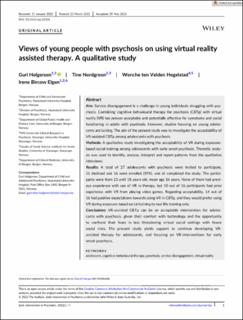| dc.contributor.author | Holgersen, Guri | |
| dc.contributor.author | Nordgreen, Tine | |
| dc.contributor.author | Hegelstad, Wenche | |
| dc.contributor.author | Elgen, Irene Bircow | |
| dc.date.accessioned | 2022-09-27T10:31:16Z | |
| dc.date.available | 2022-09-27T10:31:16Z | |
| dc.date.created | 2022-09-15T13:28:02Z | |
| dc.date.issued | 2022 | |
| dc.identifier.issn | 1751-7885 | |
| dc.identifier.uri | https://hdl.handle.net/11250/3021708 | |
| dc.description.abstract | Aim
Service disengagement is a challenge in young individuals struggling with psychosis. Combining cognitive behavioural therapy for psychosis (CBTp) with virtual reality (VR) has proven acceptable and potentially effective for symptoms and social functioning in adults with psychosis. However, studies focusing on young adolescents are lacking. The aim of the present study was to investigate the acceptability of VR-assisted CBTp among adolescents with psychosis.
Methods
A qualitative study investigating the acceptability of VR during exposure-based social training among adolescents with early onset psychosis. Thematic analysis was used to identify, analyse, interpret and report patterns from the qualitative interviews.
Results
A total of 27 adolescents with psychosis were invited to participate, 11 declined and 16 were enrolled (59%), and all completed the study. The participants were from 13 until 18 years old, mean age 16 years. None of them had previous experience with use of VR in therapy, but 10 out of 16 participants had prior experience with VR from playing video games. Regarding acceptability, 14 out of 16 had positive expectations towards using VR in CBTp, and they would prefer using VR during exposure-based social training to real-life training only.
Conclusions
VR-assisted CBTp can be an acceptable intervention for adolescents with psychosis, given their comfort with technology and the opportunity to confront their fears in less threatening virtual social settings with fewer social risks. The present study yields support to continue developing VR-assisted therapy for adolescents, and focusing on VR-interventions for early onset psychosis. | en_US |
| dc.language.iso | eng | en_US |
| dc.publisher | Wiley | en_US |
| dc.rights | Attribution-NonCommercial-NoDerivatives 4.0 Internasjonal | * |
| dc.rights.uri | http://creativecommons.org/licenses/by-nc-nd/4.0/deed.no | * |
| dc.title | Views of young people with psychosis on using virtual reality assisted therapy. A qualitative study | en_US |
| dc.type | Journal article | en_US |
| dc.type | Peer reviewed | en_US |
| dc.description.version | publishedVersion | en_US |
| dc.rights.holder | Copyright 2022 The Author(s) | en_US |
| cristin.ispublished | true | |
| cristin.fulltext | original | |
| cristin.qualitycode | 1 | |
| dc.identifier.doi | 10.1111/eip.13331 | |
| dc.identifier.cristin | 2052055 | |
| dc.source.journal | Early Intervention in Psychiatry | en_US |
| dc.identifier.citation | Early Intervention in Psychiatry. 2022. | en_US |

